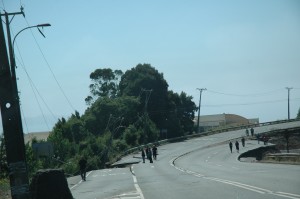 I was in the kitchen preparing our plates for dinner last night when my partner called to me to come quickly to the living room. An earthquake had just occurred in Iquique, in the northern part of the country and both electricity and communications were down. First reported to be a 7.9, it was later changed to an 8.2, after seismic readings were issued from the University of Chile. The U.S. was already reporting a measurement of 8.0. The region had been experiencing a series of smaller quakes, many ranging between 5.5 and 6.7, and everyone had been in wait of the big one.
I was in the kitchen preparing our plates for dinner last night when my partner called to me to come quickly to the living room. An earthquake had just occurred in Iquique, in the northern part of the country and both electricity and communications were down. First reported to be a 7.9, it was later changed to an 8.2, after seismic readings were issued from the University of Chile. The U.S. was already reporting a measurement of 8.0. The region had been experiencing a series of smaller quakes, many ranging between 5.5 and 6.7, and everyone had been in wait of the big one.
The epicenter was off the coast, between Arica and Iquique, and was shallow, only 44 km deep and about 75 km from the shoreline. In the aftermath of the shock of the quake, the imminence of a subsequent tsunami became a national concern. Evacuations were issued for the entire coast of Chile, and warning alerts were issued through both siren and cellular systems. We were startled to hear the alerts blast from our own cell phones, for even though we were listening to the news reports, it seemed unreal that such a tragedy could have occurred in the north without any sensation of the quake in Concepcion. After our experiences four years ago, with the 8.8, we always live in the shadow of those memories. Before sitting down in the living room to watch what was transpiring, I made sure that all of the water bottles were filled, just in case.
The news reports were interrupted for an official announcement from the Director of ONEMI, Ricardo Toro, confirming the threat of a tsunami, and the issuance of emergency evacuations for the entire coast. TV channels were soon broadcasting a breakdown of times that different communities inhabiting the coast might experience the hit. At periodic intervals, our cell phones would emit warning sounds, with text messages of evacuation displayed on the screens. This would continue until the early morning hours.
Surprisingly, the evacuations were peacefully transacted. Televised shots showed residents walking to designated safe zones. There was no rioting, no massive stampede to higher ground, just a progressive movement forward. The highway had been cut during the quake, so escape was primarily by foot.
We were glued to the television for the rest of the night, and in the morning, found that we had fallen asleep on the sofa. It had been impossible to just go to bed when so many were immersed in trauma. We were not only commiserating with our fellow Chileans, but also relieving the memories and emotions of our own past experience.
From morning news reports, we learned that the tsunami had indeed hit the coast, causing massive damage to fishing and other small boats in the harbors between Arica and Iquique. Muelle Prat, the harbor of Iquique, was in a state of great destruction, with boats stacked helter shelter upon one another. More than 900,000 had been evacuated along the entire coastline, and with the lifting of the warning, were returning to assess their situations. Classes were cancelled in most coastline communities. Surprisingly, by mid morning, 50% of electrical services in Arica and 40% in Iquique had already been restored. Thankfully, only 6 deaths were officially reported.
Much had been learned from the 2010 quake. The potential for a tsunami following a quake was taken with great seriousness, evacuations were issued and maintained, military (police force is also part of Chilean military) were immediately called to action to provide order, and food and medical supplies were put under protection. Concepcion had suffered for months without utility services, groceries, pharmacies, gas stations and other necessities of everyday life, as a result of earthly and manmade destruction. Desperation by the third day had caused panic in poorer areas, resulting in the ransacking and torching of many businesses.
In this day of aftermath, I give thanks to God that most had survived the destruction, and will go on to rebuild their lives. My heart and prayers will be with the communities in the north, while my thoughts will continue to ponder my own previous experiences and what is truly important in life.
Photo: this was taken during our earthquake experience in 2010, and is not that of the northern region